Customer Self-Service: A Game-Changer for 2025

What is customer self-service? It refers to tools and platforms that enable you to independently find answers and resolve issues without needing to contact a support agent. This includes resources like knowledge bases, chatbots, and FAQs. Customer self-service has become a cornerstone of modern businesses, catering to your growing demand for quick and seamless solutions.
Businesses are increasingly prioritizing self-service. For instance:
- Nine out of 10 CX leaders plan to increase self-service investments within the next two years.
- 68% of millennials prefer self-service for addressing general issues.
- 59% of customers across all age groups favor resolving problems without reaching out to representatives.
Sobot is at the forefront of this transformation, offering AI-powered chatbots and omnichannel solutions. These tools empower you to access assistance anytime, enhancing your satisfaction while helping businesses reduce operational costs.
What is Customer Self-Service and Why It Matters
Definition and Key Features
Customer self-service refers to tools and platforms that empower you to independently resolve issues or find information without relying on direct support from agents. These solutions include knowledge bases, chatbots, FAQs, and interactive voice response (IVR) systems. They are designed to simplify your experience by providing instant access to resources tailored to your needs.
Key features of customer self-service include:
- User-friendly systems: Easy navigation ensures you can quickly locate answers.
- Knowledge bases: Searchable databases offer detailed information about products and services.
- Omnichannel approach: You can engage through multiple channels like mobile apps, social media, and chatbots.
- Continuous updates: Regularly refreshed content keeps information accurate and relevant.
- Metrics for success: Tools like customer satisfaction scores and ticket deflection rates measure effectiveness.
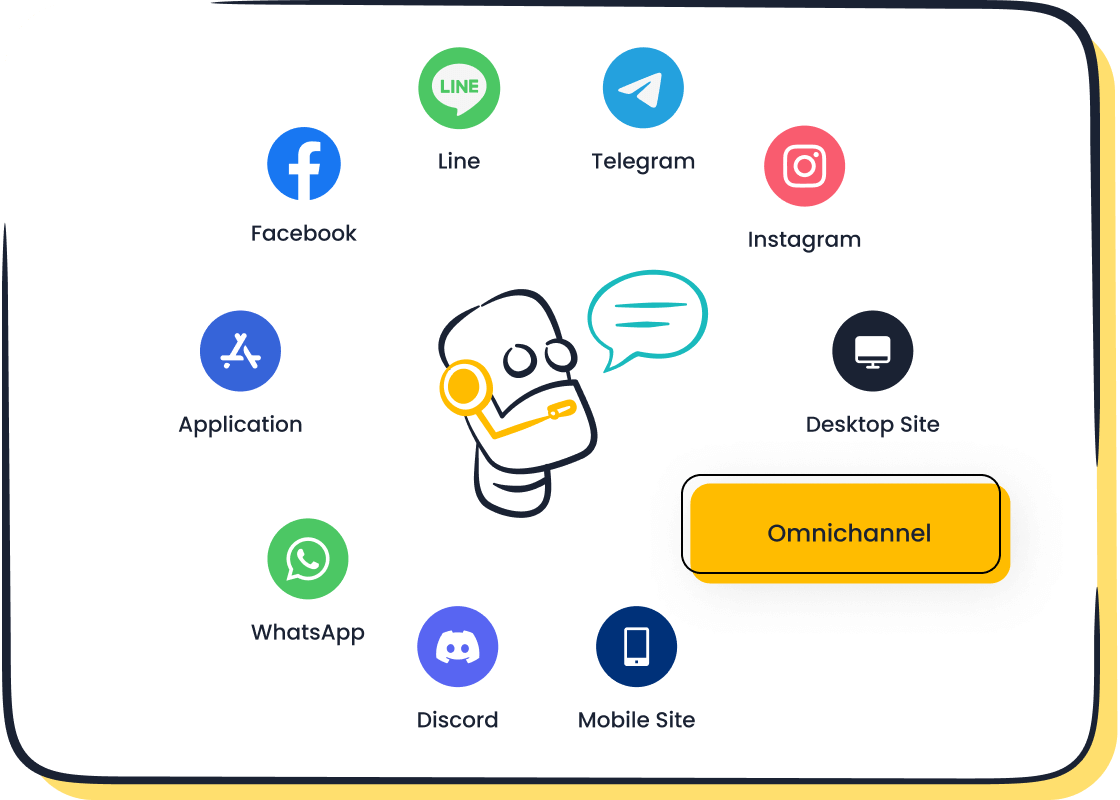
For example, Sobot’s AI-powered chatbot exemplifies these features. It operates 24/7, supports multiple languages, and integrates seamlessly across platforms like WhatsApp and SMS. Its intuitive design allows you to resolve queries without coding knowledge, making it a standout solution in the self-service landscape.
Importance in Modern Customer Service
Customer self-service has become a cornerstone of modern customer service. It aligns with your growing preference for quick, independent solutions. Studies show that companies implementing self-service technologies experience higher satisfaction rates and operational efficiency.
| Benefit | Description |
|---|---|
| Higher CSAT and NPS scores | Faster issue resolution improves satisfaction and loyalty. |
| Reduced support costs | Self-service minimizes repetitive tickets, freeing agents for complex tasks. |
| Omnichannel customer experience | You can choose your preferred contact channel, enhancing convenience. |
| Higher First Contact Resolution (FCR) | Well-prepared guides help troubleshoot effectively, increasing resolution rates. |
McDonald’s adoption of self-service kiosks demonstrates the transformative impact of these technologies. By enabling customers to place orders independently, the company has revolutionized its operations and improved satisfaction. Similarly, Sobot’s omnichannel solutions unify customer interactions across platforms, ensuring seamless service delivery.
Role in Enhancing Customer Autonomy
Customer self-service fosters autonomy by giving you control over your interactions. It allows you to solve problems at your own pace, reducing dependency on support agents. This autonomy enhances trust and satisfaction, especially in high-complexity tasks where you desire more control.
Research highlights that businesses adopting omnichannel strategies achieve a 91% higher year-over-year customer retention rate. This underscores the importance of autonomy in building long-term engagement. Sobot’s solutions, such as its AI chatbot and omnichannel platform, empower you to access resources anytime, anywhere. By integrating AI-driven automation, Sobot ensures you can resolve queries efficiently, boosting your confidence and loyalty.
Benefits of Customer Self-Service
Improved Customer Satisfaction and Experience
Self-service tools empower you to resolve issues quickly, enhancing your overall customer experience. When you find solutions independently, you feel more in control, which boosts your satisfaction. Metrics like self-service success rates and fulfillment times illustrate this improvement. For example:
| Critical Success Factor (CSF) | Key Performance Indicator (KPI) | Desired Trend |
|---|---|---|
| Users Find Solutions | Self-Service Success Rate | Upward |
| Faster Than Phone or Email | Fulfillment Time | Downward or Stable |
| Meets Needs | Satisfaction | Upward or Stable |
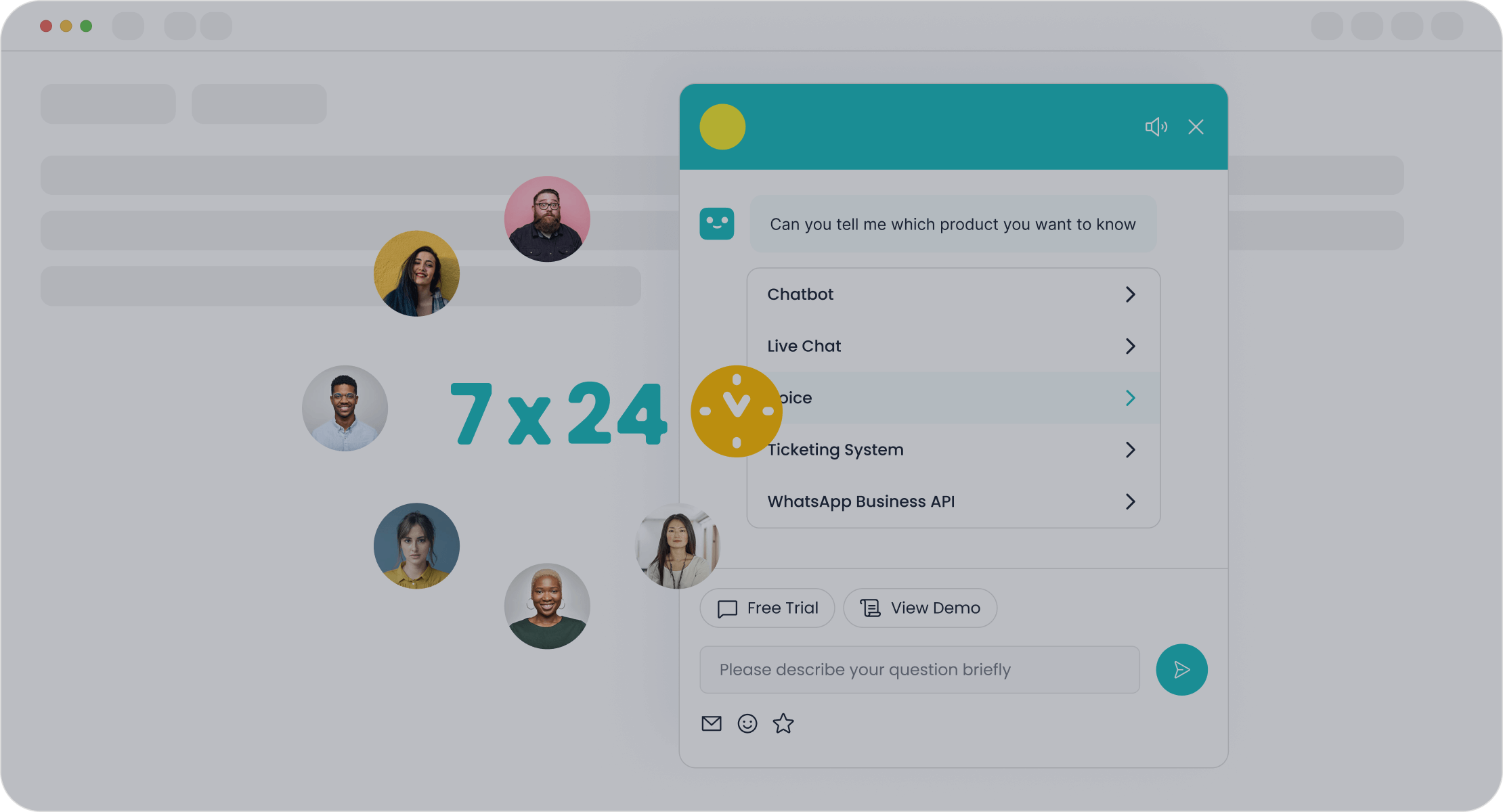
Sobot’s AI-powered chatbot exemplifies this. It operates 24/7, offering instant responses across platforms like WhatsApp and SMS. Its multilingual capabilities ensure you can interact in your preferred language, making your experience seamless and personalized. By automating repetitive queries, Sobot’s chatbot improves resolution times, leaving you with a positive impression of the service.
Cost Efficiency for Businesses
Self-service platforms reduce operational costs without compromising quality. Automating repetitive tasks allows businesses to allocate resources more effectively. For instance:
| Benefit | Description |
|---|---|
| Faster Resolution for Common Issues | Self-service tools empower customers to address their concerns immediately, reducing frustration. |
| Improved Allocation of Support Resources | Self-service systems allow support teams to focus on high-value tasks, enhancing operational efficiency. |
| Cost Efficiency Without Compromising Quality | Automating repetitive tasks lowers operational costs while maintaining service quality. |
Sobot’s solutions, such as its omnichannel platform, help businesses achieve these benefits. By integrating AI-driven automation, companies can reduce the cost per contact while maintaining high customer satisfaction. This efficiency enables businesses to scale operations without increasing expenses, ensuring sustainable growth.
Scalability and Operational Efficiency
Self-service platforms are designed to grow with your needs. They accommodate increased demand without overwhelming resources, ensuring operational efficiency. A case study highlights how structured workflows and automated tools allowed a small team to manage thousands of students effectively. This demonstrates the scalability of self-service systems in diverse environments.
- Scalability accommodates growth without overwhelming resources, ensuring operational efficiency.
- It enhances profitability by spreading fixed costs over a larger revenue base, maximizing profits.
- Scalability improves flexibility and adaptability, allowing businesses to respond to market changes effectively.
Sobot’s omnichannel solution exemplifies this scalability. It integrates multiple communication channels, enabling businesses to manage customer interactions seamlessly. Whether you’re in retail, gaming, or education, Sobot’s solutions ensure your operations remain efficient as your customer base grows.
Empowering Customers with 24/7 Accessibility
In today’s fast-paced world, you expect solutions to be available whenever you need them. This is where 24/7 accessibility in self-service channels becomes essential. It empowers you to resolve issues or find information at any time, without waiting for business hours. This constant availability not only enhances your experience but also builds trust in the brands you choose.
A growing number of customers now demand round-the-clock self-service options. Research shows that 67% of customers expect 24/7 support, while 81% want more self-service options. Companies are responding to this shift, with 95% reporting an increased demand for self-service. Additionally, 77% of consumers prefer brands that offer these options. These statistics highlight how critical accessibility is for meeting your expectations.
| Statistic | Value |
|---|---|
| Customers expecting 24/7 self-service support | 67% |
| Companies reporting increased demand for self-service | 95% |
| Consumers preferring brands with self-service options | 77% |
| Customers wanting more self-service options | 81% |
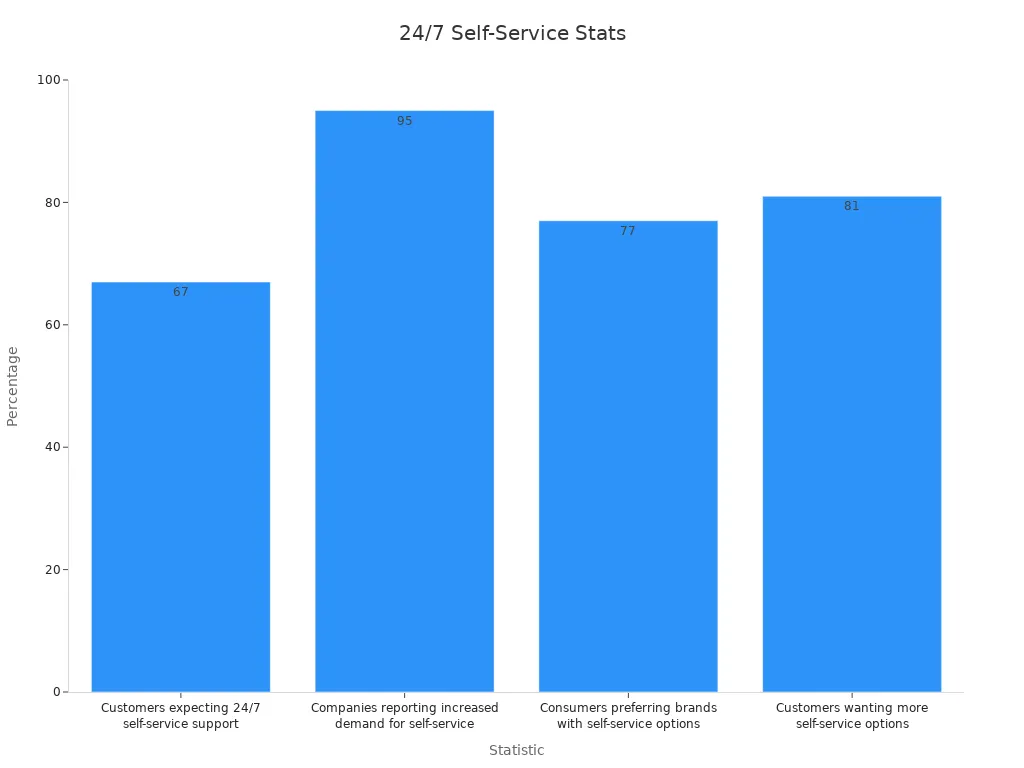
Sobot’s AI-powered chatbot exemplifies how 24/7 accessibility can transform your experience. It operates continuously, ensuring you can access support whenever you need it. Whether you’re troubleshooting a product issue or seeking quick answers, the chatbot provides instant responses. Its multilingual capabilities allow you to interact in your preferred language, making the process even more convenient.
For businesses, offering 24/7 self-service options reduces the strain on support teams. Automated tools handle repetitive queries, freeing agents to focus on complex tasks. This approach not only improves efficiency but also ensures you receive timely assistance. By integrating solutions like Sobot’s omnichannel platform, companies can provide seamless support across various channels, enhancing your satisfaction and loyalty.
Common Self-Service Channels and Applications
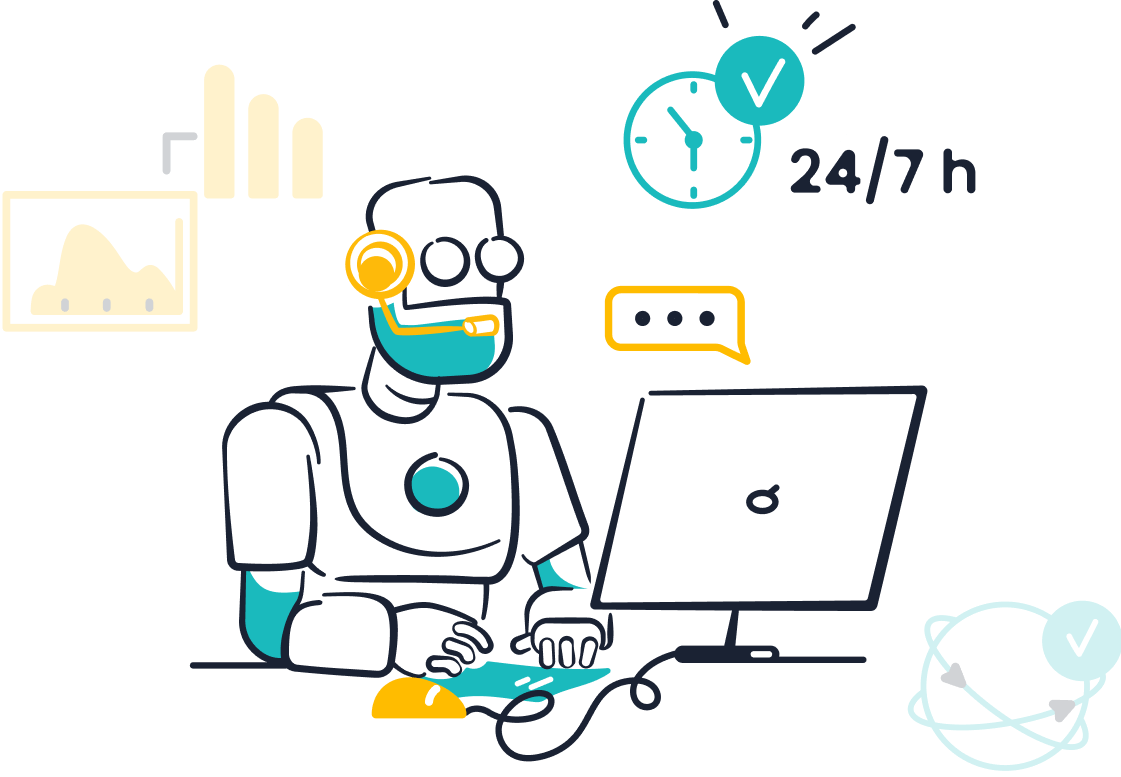
Knowledge Bases and Help Centers
Knowledge bases and help centers are essential tools for self-service. They provide you with a centralized repository of information, enabling you to find answers to your questions without contacting support. These platforms often include FAQs, how-to guides, and troubleshooting articles tailored to your needs.
- 91% of users say they would use an online knowledge base if it was available and well-designed.
- These tools reduce your dependency on live agents, allowing you to resolve issues faster.
Sobot’s omnichannel solution integrates seamlessly with knowledge bases, ensuring you can access accurate and up-to-date information across multiple platforms. Whether you’re troubleshooting a product or learning about a service, these resources empower you to take control of your experience.
AI-Powered Chatbots like Sobot Chatbot
AI-powered chatbots have revolutionized self-service by offering instant, intelligent support. These tools use advanced algorithms to understand your queries and provide accurate responses in real time.
| Statistic Description | Value | Source |
|---|---|---|
| Consumer preference for instant service | 51% prefer bots over humans for immediate assistance | Zendesk |
| Projected dominance in customer interactions | AI expected to handle 95% of interactions by 2025 | Tidio |
| Efficiency in handling inquiries | Chatbots manage up to 80% of routine tasks | Zendesk |
Sobot’s AI chatbot stands out with its 24/7 availability, multilingual capabilities, and seamless integration across platforms like WhatsApp and SMS. It not only resolves routine queries but also enhances your experience by providing personalized assistance. Businesses using Sobot’s chatbot have reported significant cost savings and improved customer satisfaction.
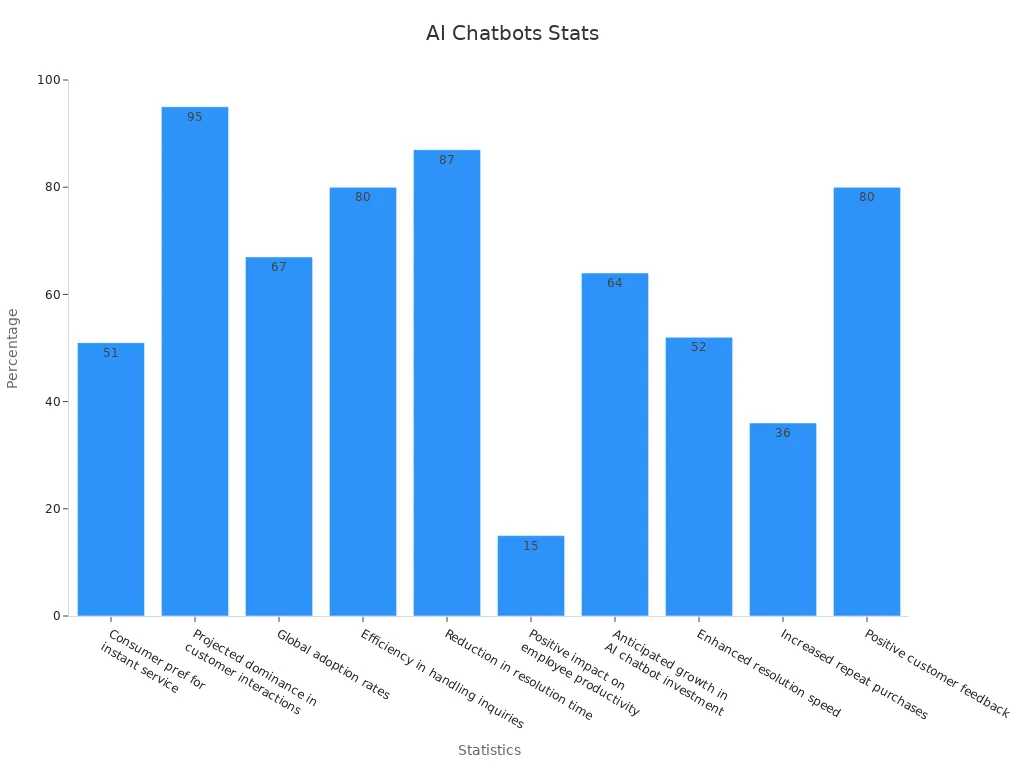
Customer Portals and Mobile Apps
Customer portals and mobile apps offer you a convenient way to manage your interactions with a brand. These platforms allow you to access account details, track orders, and even resolve issues independently.
- Self-service access reduces the need for direct support.
- Internal chat features make communication easier without requiring phone calls.
- Data analytics enable personalized experiences, enhancing your engagement.
Sobot’s omnichannel solution integrates with customer portals and mobile apps, providing you with a seamless experience. You can access information anytime, reducing frustration and improving convenience. These tools also generate valuable insights for businesses, helping them refine their products and services to better meet your needs.
Interactive Voice Response (IVR) Systems
Interactive Voice Response (IVR) systems have become a cornerstone of customer self-service. These systems allow you to interact with automated menus using voice commands or keypad inputs, enabling you to resolve issues or access information without speaking to a live agent. By streamlining interactions, IVR systems save time and improve your experience.
One of the key advantages of IVR systems is their efficiency. They collect information quickly, reducing the need for extensive human involvement. For example:
- Up to 85% of users report satisfaction with IVR systems, highlighting their positive impact on self-service.
- Participants often feel more comfortable sharing sensitive information, thanks to the anonymity these systems provide.
Modern IVR systems incorporate natural language processing (NLP), which enhances the quality of interactions. You can engage at your own pace, leading to more thoughtful and accurate responses. This improvement significantly boosts customer satisfaction. Additionally, IVR systems optimize three critical factors: data quality, response speed, and ease of interaction. Together, these elements create a seamless self-service experience.
Sobot’s IVR solutions take this technology to the next level. With features like drag-and-drop IVR design, rule-based routing, and smart call distribution, Sobot ensures you receive personalized and efficient service. Whether you’re navigating a complex issue or seeking quick answers, Sobot’s IVR systems empower you to take control of your interactions. Businesses benefit too, as these systems reduce operational costs and free up agents for more complex tasks.
In industries like retail, financial services, and education, IVR systems have proven invaluable. They handle high call volumes, provide 24/7 accessibility, and ensure consistent service quality. By integrating Sobot’s IVR solutions, companies can enhance customer satisfaction while maintaining operational efficiency.
Challenges in Implementing Customer Self-Service
Balancing Automation with Human Interaction
Finding the right balance between automation and human interaction is critical for creating a seamless self-service experience. While automation can handle repetitive tasks efficiently, some situations require the empathy and expertise of a human agent. For example:
- High-end retailers and banks now offer click-to-call options, allowing you to connect with advisors instantly. This approach has improved conversions by up to 20% for companies like MásMóvil.
- AI tools excel at managing routine queries, but human agents remain essential for resolving complex or sensitive issues.
To achieve this balance, businesses should:
- Use technology for routine tasks, freeing agents to focus on more challenging problems.
- Design chatbots to feel personal and escalate issues to humans when necessary.
- Train agents to handle escalations effectively, ensuring a smooth transition from automation to human support.
Sobot’s AI chatbot exemplifies this approach. It automates repetitive queries while seamlessly transferring complex cases to human agents, ensuring you receive the best of both worlds.
Ensuring Accessibility and Usability for All Customers
Ensuring accessibility is vital for making self-service platforms inclusive and effective. A well-designed interface improves usability, allowing you to navigate and resolve issues effortlessly. Studies show that intuitive layouts and multi-language support significantly enhance user engagement and trust.
| Aspect | Findings |
|---|---|
| User Experience (UX) | Strongly influences your preference for self-service platforms. |
| Interface Design (UI) | Boosts satisfaction and loyalty by simplifying interactions. |
| Accessibility Features | Multi-language support and assistive technologies broaden the platform's reach. |
Sobot’s solutions prioritize accessibility by offering multilingual support and compatibility with assistive technologies. These features ensure you can interact with the platform regardless of your language or abilities, making self-service more inclusive.
Overcoming Technical and Integration Barriers
Integrating self-service tools with existing systems can be challenging. Many businesses struggle with data silos and compatibility issues, which hinder seamless operations. For example:
| Barrier Description | Suggested Solutions |
|---|---|
| Complexity of integration with existing systems | Choose solutions with robust integration capabilities, collaborate with IT teams, and implement in phases. |
Sobot’s omnichannel platform addresses these challenges by offering robust integration capabilities. It connects seamlessly with tools like Salesforce and Shopify, ensuring smooth data flow and operational efficiency. This approach allows businesses to provide you with a unified and consistent self-service experience.
Managing Customer Expectations Effectively
Managing your expectations is crucial for ensuring a positive self-service experience. When you know what to expect, you feel more confident and satisfied with the service. Businesses that prioritize clear communication and realistic promises often see higher customer satisfaction and loyalty.
To effectively manage expectations, companies should focus on three key strategies:
-
Set Realistic Expectations: Clearly outline what the self-service platform can and cannot do. For example, providing accurate timelines for issue resolution helps you plan better and reduces frustration. If a chatbot can handle 80% of routine queries but escalates complex issues to agents, this should be communicated upfront.
-
Communicate Availability and Response Times: Transparency about service availability is essential. Letting you know that a self-service portal operates 24/7 ensures you can access solutions anytime. This round-the-clock accessibility empowers you to resolve issues without waiting for business hours.
-
Collect and Act on Feedback: Your feedback is invaluable for improving self-service platforms. Businesses that analyze help desk tickets and update knowledge bases regularly can provide you with more accurate and relevant information. This commitment to continuous improvement strengthens trust and satisfaction.
Sobot exemplifies these strategies through its AI-powered chatbot and omnichannel solutions. The chatbot uses advanced analytics to understand your intent and provide personalized responses. Its seamless integration across platforms like WhatsApp ensures you receive consistent support. Additionally, Sobot’s tools enable businesses to analyze customer interactions, refine their services, and keep you informed about updates.
By leveraging AI and predictive analytics, companies can further enhance your self-service journey. For instance, an AI-powered search engine simplifies finding answers by understanding natural language. This innovation makes your experience faster and more intuitive, ensuring you feel supported every step of the way.
Optimizing Customer Self-Service for 2025
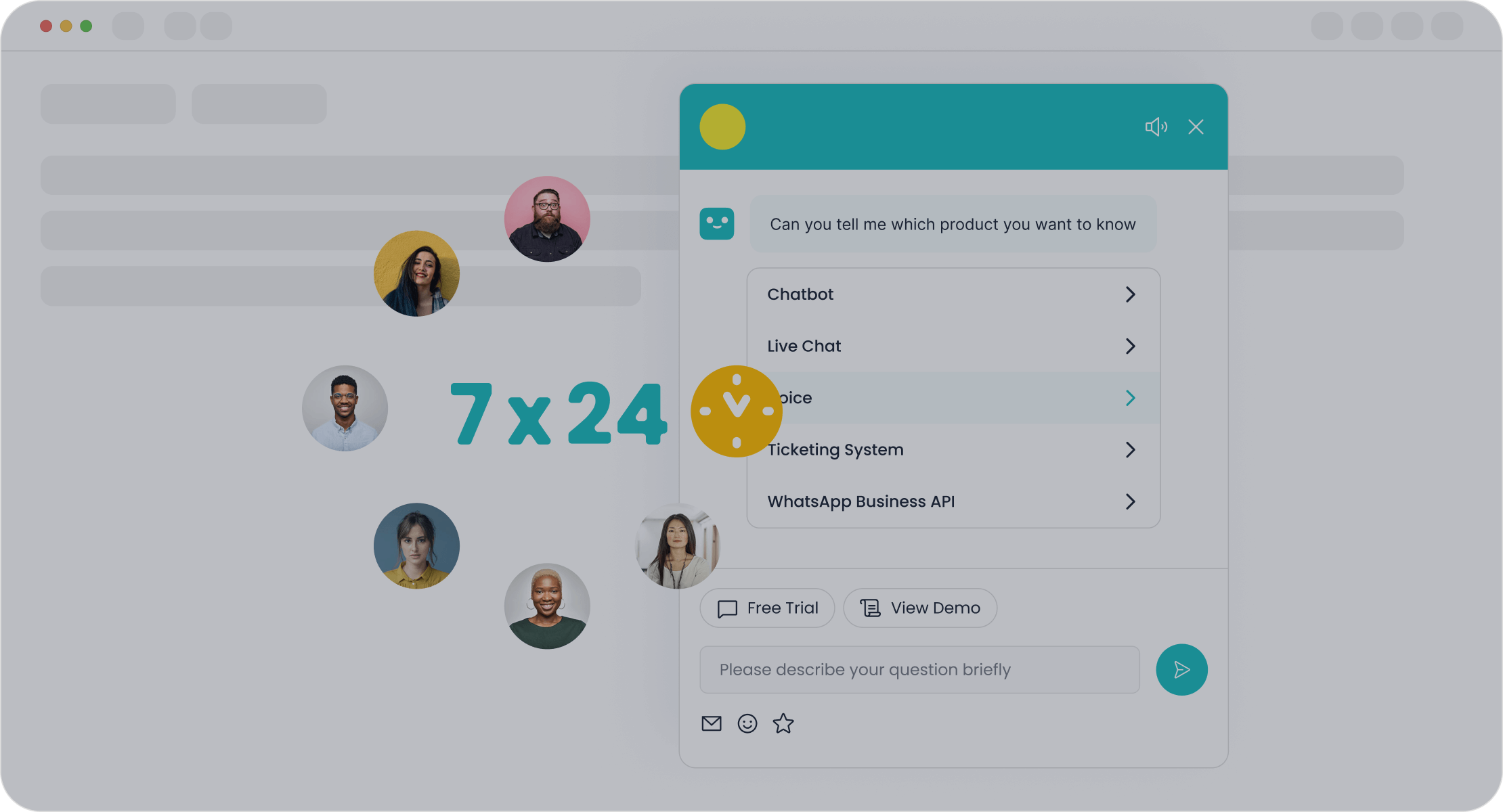
Leveraging AI and Predictive Analytics
AI and predictive analytics are transforming self-service into a proactive and intelligent customer service strategy. These technologies analyze patterns in customer behavior, enabling businesses to anticipate your needs and provide tailored solutions before you even ask. For example, predictive analytics can identify recurring issues and suggest fixes, reducing frustration and improving your experience.
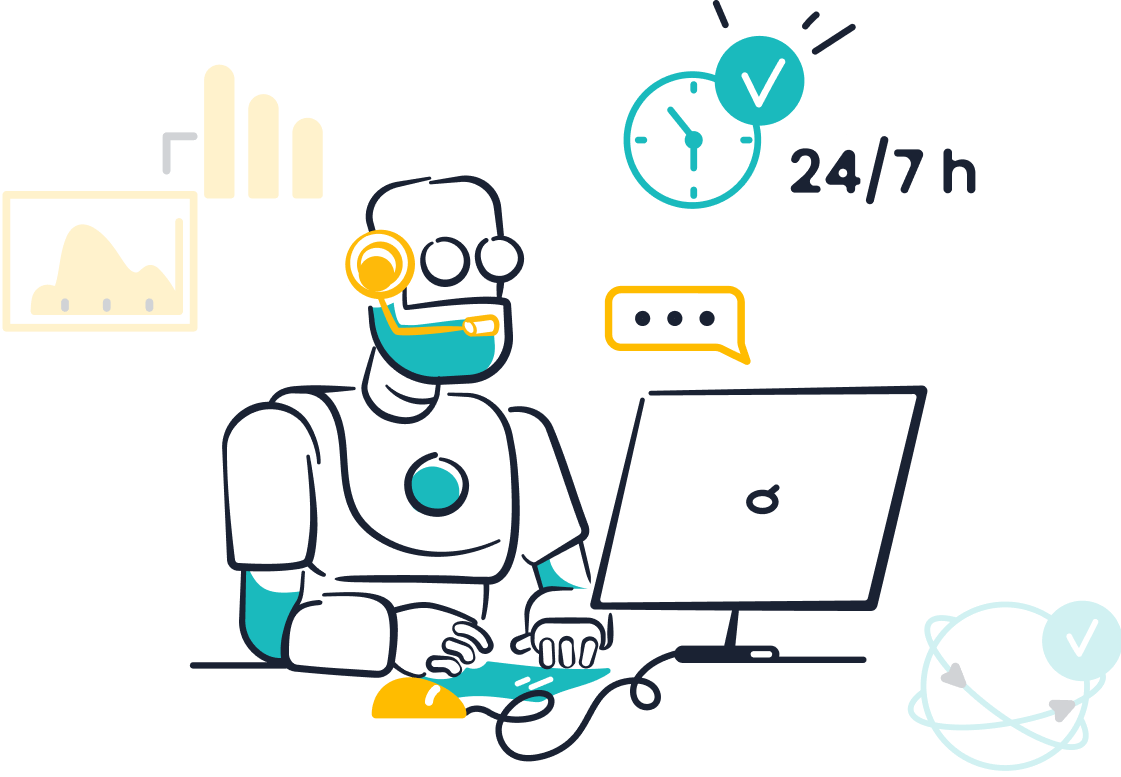
AI-powered tools, such as Sobot’s chatbot, exemplify this innovation. The chatbot uses natural language processing to understand your queries and provide accurate responses instantly. Its ability to operate 24/7 ensures continuous accessibility, allowing you to resolve issues anytime. Predictive analytics further enhance its capabilities by identifying trends and optimizing responses based on your preferences. This combination of AI and analytics not only improves resolution times but also builds customer independence by empowering you to solve problems autonomously.
Businesses adopting AI and predictive analytics report increased efficiency and higher satisfaction rates. These technologies streamline operations by automating repetitive tasks, freeing agents to focus on complex issues. As a result, companies can scale their self-service platforms without compromising quality, ensuring you receive consistent and personalized support.
Personalization and Omnichannel Integration with Sobot Solutions
Personalization is key to building customer independence and enhancing your self-service experience. When platforms adapt to your preferences, you feel valued and engaged. Omnichannel integration takes personalization a step further by unifying interactions across multiple channels, ensuring seamless communication regardless of where you start or end your journey.
Sobot’s omnichannel solution excels in this area. It integrates various communication platforms, such as WhatsApp, SMS, and social media, into a single workspace. This approach reduces response time by 80% and increases agent efficiency by 20%. For you, this means faster resolutions and a more cohesive experience. Whether you’re accessing a knowledge base or interacting with a chatbot, Sobot ensures the information is consistent and tailored to your needs.
Personalization also drives loyalty. When businesses understand your preferences and anticipate your needs, you’re more likely to return. Sobot’s solutions leverage AI to analyze your interactions and provide proactive insights, enhancing your satisfaction and trust. By combining personalization with omnichannel integration, Sobot helps businesses create a customer service strategy that aligns with your expectations and fosters long-term engagement.
Continuous Feedback and Iterative Improvement
Continuous feedback is essential for refining self-service platforms and ensuring they meet your evolving needs. Companies that prioritize iterative improvement can adapt quickly to market changes, enhancing both efficiency and responsiveness. Regular updates based on your feedback ensure the platform remains relevant and effective.
Several industry leaders demonstrate the power of continuous feedback:
- Spotify conducts regular retrospectives and health checks, enabling ongoing refinement and innovation.
- Toyota embraces the Kaizen culture, encouraging employees to suggest improvements for steady enhancements.
- Microsoft uses DevOps practices to integrate rapid feedback loops, ensuring continuous product improvement.
- ING focuses on customer value and automation tools to drive efficiency and responsiveness.
- GE Aviation applies Lean Six Sigma principles to enhance product quality and communication.
Sobot incorporates these principles into its solutions. Its AI-powered chatbot and omnichannel platform analyze customer interactions to identify areas for improvement. By collecting and acting on feedback, Sobot ensures its tools evolve to meet your needs. This commitment to iterative improvement not only enhances your experience but also builds trust in the brand.
For businesses, continuous feedback drives innovation and efficiency. It allows companies to refine their self-service platforms, ensuring they remain competitive in a rapidly changing market. By adopting practices like regular retrospectives and automation tools, businesses can optimize their operations and provide you with a superior self-service experience.
Future Trends in Self-Service Technology
The future of self-service technology is evolving rapidly, driven by advancements in digital transformation and changing customer expectations. As businesses strive to enhance customer service, several emerging trends are shaping the landscape. These innovations promise to make your interactions faster, more intuitive, and highly personalized.
1. Increasing Reliance on Self-Service Technologies
Businesses are increasingly adopting self-service technologies to replace traditional retail and support tasks. For example, self-checkout kiosks in grocery stores allow you to scan and pay for items independently, reducing wait times. Similarly, online portals enable you to track orders or manage subscriptions without contacting customer service. This shift not only improves your convenience but also helps businesses streamline operations.

Sobot’s AI-powered chatbot exemplifies this trend. It automates routine queries, empowering you to resolve issues instantly. By integrating with platforms like WhatsApp and SMS, it ensures you can access support anytime, enhancing your overall experience.
2. The Rise of Untact Services
Untact services, which minimize human interaction through digital technologies, are gaining popularity. These services cater to your preference for contactless solutions, especially in industries like retail and healthcare. For instance, virtual consultations with doctors or automated prescription refills allow you to access essential services without visiting a physical location.
Sobot’s omnichannel solution supports untact services by providing seamless communication across digital platforms. Whether you’re using a chatbot or accessing a knowledge base, Sobot ensures your interactions remain efficient and hassle-free.
3. Integration of Advanced Technologies
Emerging technologies like RFID, IoT, and augmented reality (AR) are transforming self-service experiences. RFID tags in retail stores enable you to check product details by simply scanning them with your smartphone. IoT devices, such as smart home assistants, allow you to control appliances or order groceries with voice commands. AR applications let you visualize furniture in your home before making a purchase, enhancing your decision-making process.
| Trend/Technology | Description |
|---|---|
| Self-service technologies | Increasing reliance on self-service to replace traditional retail tasks. |
| Untact services | Rise of services minimizing human interaction through digital technologies. |
| Advanced technologies | Integration of RFID, IoT, and augmented reality to enhance consumer experiences. |
| Digital transformation | Growth in self-service solutions across various industries due to digital transformation. |
Sobot’s solutions align with these advancements. Its chatbot leverages AI to provide real-time assistance, while its omnichannel platform integrates seamlessly with IoT-enabled devices, ensuring you receive consistent support across all touchpoints.
4. Growth in Digital Transformation
Digital transformation is accelerating the adoption of self-service solutions across industries. In education, online portals allow students to access course materials and submit assignments independently. In financial services, mobile apps enable you to manage accounts, transfer funds, or apply for loans without visiting a branch. This trend reflects a broader shift toward empowering you with tools that simplify complex processes.
Sobot plays a pivotal role in this transformation. Its omnichannel platform consolidates customer interactions across channels, ensuring you receive personalized and efficient service. By integrating AI-driven automation, Sobot helps businesses adapt to the demands of digital transformation, enhancing your experience while improving operational efficiency.
5. Proactive and Predictive Self-Service
The future of self-service lies in proactive and predictive technologies. These tools anticipate your needs and offer solutions before you even ask. For example, a predictive chatbot might notify you about a delayed delivery and suggest alternative options. This level of foresight not only saves you time but also builds trust in the brand.
Sobot’s AI chatbot incorporates predictive analytics to enhance your interactions. It identifies patterns in your queries and provides tailored responses, ensuring you receive accurate information quickly. This proactive approach empowers you to resolve issues independently, boosting your confidence and satisfaction.
6. Personalization Through AI
Personalization is becoming a cornerstone of self-service technology. AI-driven tools analyze your preferences and behavior to deliver customized experiences. For instance, a streaming platform might recommend shows based on your viewing history, while an e-commerce site suggests products you’re likely to buy. This level of personalization makes your interactions more engaging and relevant.
Sobot excels in delivering personalized customer service. Its omnichannel solution integrates data from multiple touchpoints, allowing businesses to tailor their responses to your unique needs. Whether you’re interacting with a chatbot or accessing a knowledge base, Sobot ensures the information is relevant and helpful.
Tip: As self-service technology evolves, staying informed about these trends can help you make the most of the tools available. Look for platforms that prioritize innovation and customer-centricity, like Sobot, to ensure a seamless experience.
Customer self-service is reshaping how businesses operate, offering faster resolutions and greater autonomy for you. By 2025, companies that embrace self-service will see higher customer satisfaction and reduced costs. Sobot leads this transformation with its AI-powered chatbot and omnichannel solutions, enabling 24/7 support and seamless integration. For example, Sobot’s tools helped OPPO achieve an 83% chatbot resolution rate and a 57% repurchase increase. Adopting self-service strategies ensures you stay competitive, meet evolving expectations, and build lasting loyalty. Explore Sobot’s solutions to future-proof your business and enhance your customer experience.
FAQ
What is the main purpose of customer self-service?
Customer self-service helps you resolve issues or find information independently. It uses tools like knowledge bases, chatbots, and IVR systems. For example, Sobot’s AI-powered chatbot operates 24/7, offering instant solutions. This approach saves time and enhances your experience by reducing the need for live agent support.
How does customer self-service improve satisfaction?
Self-service empowers you to solve problems quickly. Studies show 68% of millennials prefer self-service for general issues. Tools like Sobot’s omnichannel solutions ensure seamless access across platforms, making your experience smoother and more satisfying. Faster resolutions lead to higher customer satisfaction scores.
Can self-service reduce business costs?
Yes, self-service automates repetitive tasks, cutting operational costs. Sobot’s AI-powered chatbot reduces agent workload by 70%, saving up to 50% on staffing expenses. This efficiency allows businesses to allocate resources to complex tasks, ensuring quality service while managing costs effectively.
What industries benefit most from self-service?
Industries like retail, gaming, and financial services benefit greatly. For instance, OPPO used Sobot’s chatbot to achieve an 83% resolution rate during peak shopping periods. Self-service tools streamline operations, improve customer satisfaction, and enhance scalability across various sectors.
How does Sobot ensure accessibility in self-service?
Sobot’s solutions prioritize accessibility with multilingual support and 24/7 availability. Whether you use WhatsApp, SMS, or a mobile app, Sobot ensures you can access help anytime. This inclusivity makes self-service effective for diverse customer needs.
See Also
Transforming Customer Support With AI Service Agents
Enhancing Efficiency Through AI Customer Service Solutions
Best Customer Feedback Software Options for 2024
